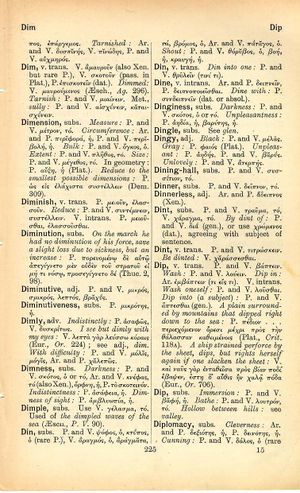dine: Difference between revisions
From LSJ
m (Woodhouse1 replacement) |
mNo edit summary |
||
| Line 5: | Line 5: | ||
[[Aristophanes|Ar.]] and [[prose|P.]] [[δειπνεῖν]], [[prose|P.]] [[δειπνοποιεῖσθαι]]. | [[Aristophanes|Ar.]] and [[prose|P.]] [[δειπνεῖν]], [[prose|P.]] [[δειπνοποιεῖσθαι]]. | ||
[[dine with]]: [[prose|P.]] [[ | [[dine with]]: [[prose|P.]] [[συνδειπνεῖν]] (dat. or absol.). | ||
}} | }} | ||
{{Lewis | {{Lewis | ||
|lshtext=<b>dīnē</b>: es, f., = [[δίνη]],<br /><b>I</b> a [[whirlwind]]: [[vertex]] [[ille]] est, vel uti dicitur [[dine]], etc., Ap. de Mundo, 12, p. 62, 32 (dub. Hild. Helicias). | |lshtext=<b>dīnē</b>: es, f., = [[δίνη]],<br /><b>I</b> a [[whirlwind]]: [[vertex]] [[ille]] est, vel uti dicitur [[dine]], etc., Ap. de Mundo, 12, p. 62, 32 (dub. Hild. Helicias). | ||
}} | }} | ||

